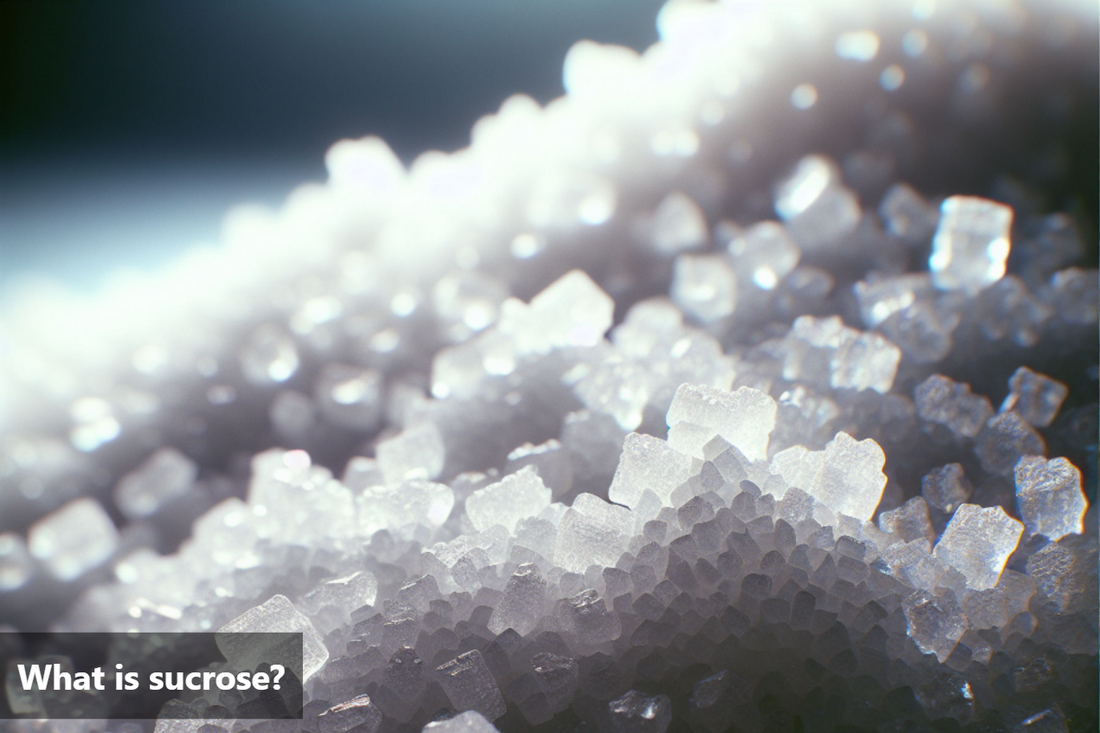Sucrose, commonly referred to as table sugar, plays a significant role in our everyday lives as a simple carbohydrate, consisting of glucose and fructose molecules. This versatile ingredient, primarily extracted from natural sources such as sugarcane and sugar beets, has long been utilized for its exquisite sweet flavor across a wide array of culinary applications.
Whether enhancing the taste of homemade desserts, serving as a vital preservative in various food products, or contributing to the carbonation of soft drinks, sucrose holds a crucial place in the realm of food and beverage industry. However, despite its widespread usage and undeniable charm, maintaining a balanced consumption of sucrose is paramount for ensuring optimal health and well-being.
It is essential to exercise moderation when incorporating sucrose into your diet, as overindulgence can potentially lead to a myriad of health concerns and adverse effects on one's overall vitality. By being mindful of your sugar intake and making informed dietary choices, you can savor the sweetness of sucrose while safeguarding your physical well-being for the long run.
Properties of Sucrose
-
Physical Properties:
-
Appearance: Sucrose appears as white, odorless, and crystalline powder or colorless crystals.
-
Taste: Predominantly sweet, making it a popular choice for sweetening various foods and beverages.
-
Chemical Properties:
-
Composition: Sucrose is a disaccharide composed of glucose and fructose molecules.
-
Solubility: Soluble in water, forming a clear solution.
-
Caramelization: When heated, sucrose can undergo caramelization, turning into a brown liquid with a rich flavor.
-
Biological Effects:
-
Energy Source: Provides a rapid source of energy due to its quick breakdown into glucose and fructose.
-
Moderation: Moderate consumption is generally well-tolerated, but excessive intake can lead to adverse health effects such as weight gain, tooth decay, and increased risk of obesity and diabetes.
Differences Between Sucrose and Other Sweeteners
|
Differences |
Sucrose (Table Sugar) |
Sucralose (Artificial Sweetener) |
|---|---|---|
|
Taste Profile |
Natural sweetness with distinct flavor |
Sweeter taste than sucrose but lacks depth of flavor |
|
Calorie Content |
Higher calorie content |
No added calories, suitable for low-calorie diets |
|
Health Effects |
Potential negative impacts if consumed in excess (e.g., weight gain, dental issues) |
Considered safe for consumption, does not contribute to tooth decay or calorie intake, approved by regulatory authorities |
Health Impacts of Sucrose Consumption
Impact of Excess Sucrose Consumption:
-
Weight Gain: Excessive sucrose intake can lead to increased overall calorie consumption, potentially contributing to obesity over time.
-
Dental Problems: Frequent consumption of sucrose can result in dental issues like enamel damage and cavities due to bacterial feeding on sugars.
-
Risk of Chronic Diseases: An overabundance of sucrose is linked to a higher risk of chronic conditions such as type 2 diabetes, heart disease, and metabolic syndrome.
Impact of Sucrose on Diabetes
Blood Sugar Levels
-
Rapid Digestion: Sucrose is quickly broken down into glucose and fructose in the digestive system, leading to a rapid increase in blood glucose levels.
-
Glycemic Response: This rapid rise can cause spikes in blood sugar, which is problematic for individuals with diabetes who need to manage their blood glucose levels closely.
Insulin Response
-
Increased Insulin Demand: The rapid rise in blood glucose levels requires the body to produce more insulin to help cells absorb the glucose. In people with diabetes, especially type 2 diabetes, insulin resistance can make it difficult for the body to manage these spikes effectively.
-
Beta Cell Stress: For those with type 1 diabetes, where the body produces little or no insulin, or with advanced type 2 diabetes, where beta cells are impaired, consuming sucrose can further stress these cells.
Metabolism of Sucrose
Sucrose, a type of sugar that is commonly found in various foods, gets broken down into glucose and fructose during the absorption process. Glucose and fructose are then absorbed into the bloodstream to provide energy to the body. The body utilizes this energy for various functions such as cell growth, muscle contraction, and overall metabolic processes. Additionally, excess glucose derived from sucrose can be stored in the liver as glycogen for future energy needs. It is crucial to maintain a balance in sucrose consumption to support optimal energy levels and overall health.
To conclude:
In conclusion, sucrose, commonly known as table sugar, plays a significant role in our diets. From what sucrose is to its potential health impacts, understanding the importance of moderation is key in maintaining overall health and well-being. Sucrose, consisting of glucose and fructose, is a natural sweetener widely used in various food and beverage products. It provides the desired sweetness but should be consumed in moderation.
Excessive consumption of sucrose can lead to weight gain, dental problems, and an increased risk of chronic diseases. Maintaining a balanced diet and monitoring sugar intake is crucial for mitigating these effects. It is essential to differentiate between sucrose and other sweeteners like sucralose to make informed dietary choices.
Being mindful of the amount of sucrose consumed can contribute to a healthier lifestyle. Remember, sucrose can be a part of a balanced diet when consumed in moderation. By understanding the effects of sucrose on the body and practicing moderation, individuals can enjoy the sweetness of sucrose without compromising their health.
FAQs:
-
What is sucrose?
Sucrose is a type of sugar that is commonly known as table sugar. It is composed of glucose and fructose molecules.
-
Is sucrose natural or synthetic?
Sucrose is a natural compound that occurs naturally in various plants, particularly in sugar cane and sugar beet.
-
How is sucrose used in food?
Sucrose is used as a sweetener in a wide range of food and beverages, including desserts, baked goods, and soft drinks.
-
Is sucrose harmful to health?
Consuming sucrose in moderation is generally safe for most people. However, excessive intake of sucrose can contribute to health issues like obesity and tooth decay.
-
Are there any alternatives to sucrose?
Yes, there are various alternatives to sucrose, such as honey, maple syrup, agave nectar, and artificial sweeteners, which can be used as substitutes in cooking and baking.
day lives as a simple carbohydrate, consisting of glucose and fructose molecules. This versatile ingredient, primarily extracted from natural sources such as sugarcane and sugar beets, has long been utilized for its exquisite sweet flavor across a wide array of culinary applications.
Whether enhancing the taste of homemade desserts, serving as a vital preservative in various food products, or contributing to the carbonation of soft drinks, sucrose holds a crucial place in the realm of food and beverage industry. However, despite its widespread usage and undeniable charm, maintaining a balanced consumption of sucrose is paramount for ensuring optimal health and well-being.
It is essential to exercise moderation when incorporating sucrose into your diet, as overindulgence can potentially lead to a myriad of health concerns and adverse effects on one's overall vitality. By being mindful of your sugar intake and making informed dietary choices, you can savor the sweetness of sucrose while safeguarding your physical well-being for the long run.
Properties of Sucrose
-
Physical Properties:
-
Appearance: Sucrose appears as white, odorless, and crystalline powder or colorless crystals.
-
Taste: Predominantly sweet, making it a popular choice for sweetening various foods and beverages.
-
Chemical Properties:
-
Composition: Sucrose is a disaccharide composed of glucose and fructose molecules.
-
Solubility: Soluble in water, forming a clear solution.
-
Caramelization: When heated, sucrose can undergo caramelization, turning into a brown liquid with a rich flavor.
-
Biological Effects:
-
Energy Source: Provides a rapid source of energy due to its quick breakdown into glucose and fructose.
-
Moderation: Moderate consumption is generally well-tolerated, but excessive intake can lead to adverse health effects such as weight gain, tooth decay, and increased risk of obesity and diabetes.
Differences Between Sucrose and Other Sweeteners
|
Differences |
Sucrose (Table Sugar) |
Sucralose (Artificial Sweetener) |
|---|---|---|
|
Taste Profile |
Natural sweetness with distinct flavor |
Sweeter taste than sucrose but lacks depth of flavor |
|
Calorie Content |
Higher calorie content |
No added calories, suitable for low-calorie diets |
|
Health Effects |
Potential negative impacts if consumed in excess (e.g., weight gain, dental issues) |
Considered safe for consumption, does not contribute to tooth decay or calorie intake, approved by regulatory authorities |
Health Impacts of Sucrose Consumption
Impact of Excess Sucrose Consumption:
-
Weight Gain: Excessive sucrose intake can lead to increased overall calorie consumption, potentially contributing to obesity over time.
-
Dental Problems: Frequent consumption of sucrose can result in dental issues like enamel damage and cavities due to bacterial feeding on sugars.
-
Risk of Chronic Diseases: An overabundance of sucrose is linked to a higher risk of chronic conditions such as type 2 diabetes, heart disease, and metabolic syndrome.
Metabolism of Sucrose
Sucrose, a type of sugar that is commonly found in various foods, gets broken down into glucose and fructose during the absorption process. Glucose and fructose are then absorbed into the bloodstream to provide energy to the body. The body utilizes this energy for various functions such as cell growth, muscle contraction, and overall metabolic processes. Additionally, excess glucose derived from sucrose can be stored in the liver as glycogen for future energy needs. It is crucial to maintain a balance in sucrose consumption to support optimal energy levels and overall health.
Bottom Line
Sucrose, commonly known as table sugar, plays a significant role in our diets. From what sucrose is to its potential health impacts, understanding the importance of moderation is key in maintaining overall health and well-being. Sucrose, consisting of glucose and fructose, is a natural sweetener widely used in various food and beverage products. It provides the desired sweetness but should be consumed in moderation.
Excessive consumption of sucrose can lead to weight gain, dental problems, and an increased risk of chronic diseases. Maintaining a balanced diet and monitoring sugar intake is crucial for mitigating these effects. It is essential to differentiate between sucrose and other sweeteners like sucralose to make informed dietary choices.
Being mindful of the amount of sucrose consumed can contribute to a healthier lifestyle. Remember, sucrose can be a part of a balanced diet when consumed in moderation. By understanding the effects of sucrose on the body and practicing moderation, individuals can enjoy the sweetness of sucrose without compromising their health.
FAQs
-
What is sucrose?
Sucrose is a type of sugar that is commonly known as table sugar. It is composed of glucose and fructose molecules.
-
Is sucrose natural or synthetic?
Sucrose is a natural compound that occurs naturally in various plants, particularly in sugar cane and sugar beet.
-
How is sucrose used in food?
Sucrose is used as a sweetener in a wide range of food and beverages, including desserts, baked goods, and soft drinks.
-
Is sucrose harmful to health?
Consuming sucrose in moderation is generally safe for most people. However, excessive intake of sucrose can contribute to health issues like obesity and tooth decay.
-
Are there any alternatives to sucrose?
Yes, there are various alternatives to sucrose, such as honey, maple syrup, agave nectar, and artificial sweeteners, which can be used as substitutes in cooking and baking.
This Blog post is an initiative by DiabeSmart, to provide accurate and Nutritionist / Doctor approved information related to Diabetes. DiabeSmart is India's first Food brand designed specifically for Diabetics, that has been clinically tested on Diabetics and Pre-Diabetics to deliver 55% - 70% lower Sugar spikes. DiabeSmart is part of Lo! Foods - India's leading brand for Everyday Functional Health foods.











